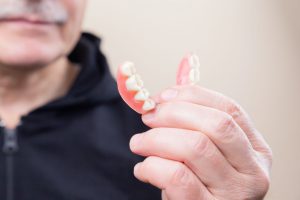 According to statistics, 13% of UK adults wear dentures. But what are those exactly? Is it the plastic teeth that elderly people lose when they sneeze on cartoons or is it fixed teeth that never move?
According to statistics, 13% of UK adults wear dentures. But what are those exactly? Is it the plastic teeth that elderly people lose when they sneeze on cartoons or is it fixed teeth that never move?
Well, both can be true. What most people picture when hearing “dentures” are the removable artificial teeth that can be made of acrylic or metal. They provide a cheap solution to tooth loss and allow edentulous patients to have a normal life.
What are all the different alternatives when you have lost your teeth? Let’s see.
Contents
The effects of missing teeth
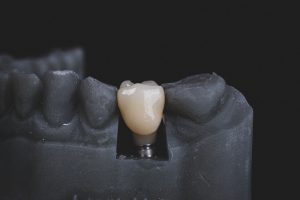 Teeth are supposed to work together, so missing one or more can take its toll on your speech, reduce comfort when eating and limit food choice. As a result of painful chewing, you may end up eating on one side of your mouth. In turn, your jaw and facial muscles will be imminently affected.
Teeth are supposed to work together, so missing one or more can take its toll on your speech, reduce comfort when eating and limit food choice. As a result of painful chewing, you may end up eating on one side of your mouth. In turn, your jaw and facial muscles will be imminently affected.
Bone loss develops four times faster in the lower jaw, so missing teeth affect your overall appearance.
Research shows that tooth loss can influence our health in a variety of ways:
- Significantly reduced consumption of fruits and vegetables, hence reducing fibre intake, which has a direct negative effect on the gut microbiome
- Increased consumption of saturated fats, leading to obesity, and increased risk of heart disease
- Increased rates of gastrointestinal cancer, and elevated rates of ulcers
- Increased risk of noninsulin-dependent diabetes mellitus (type 2)
- Increased risk of hypertension
Types of dentures
Areas with missing teeth can cause trouble when eating and speaking. Therefore, you may need complete or partial dentures. The first is purposed to either replace the full upper or lower arch and the latter – to replace one or a few missing teeth.
Complete removable denture
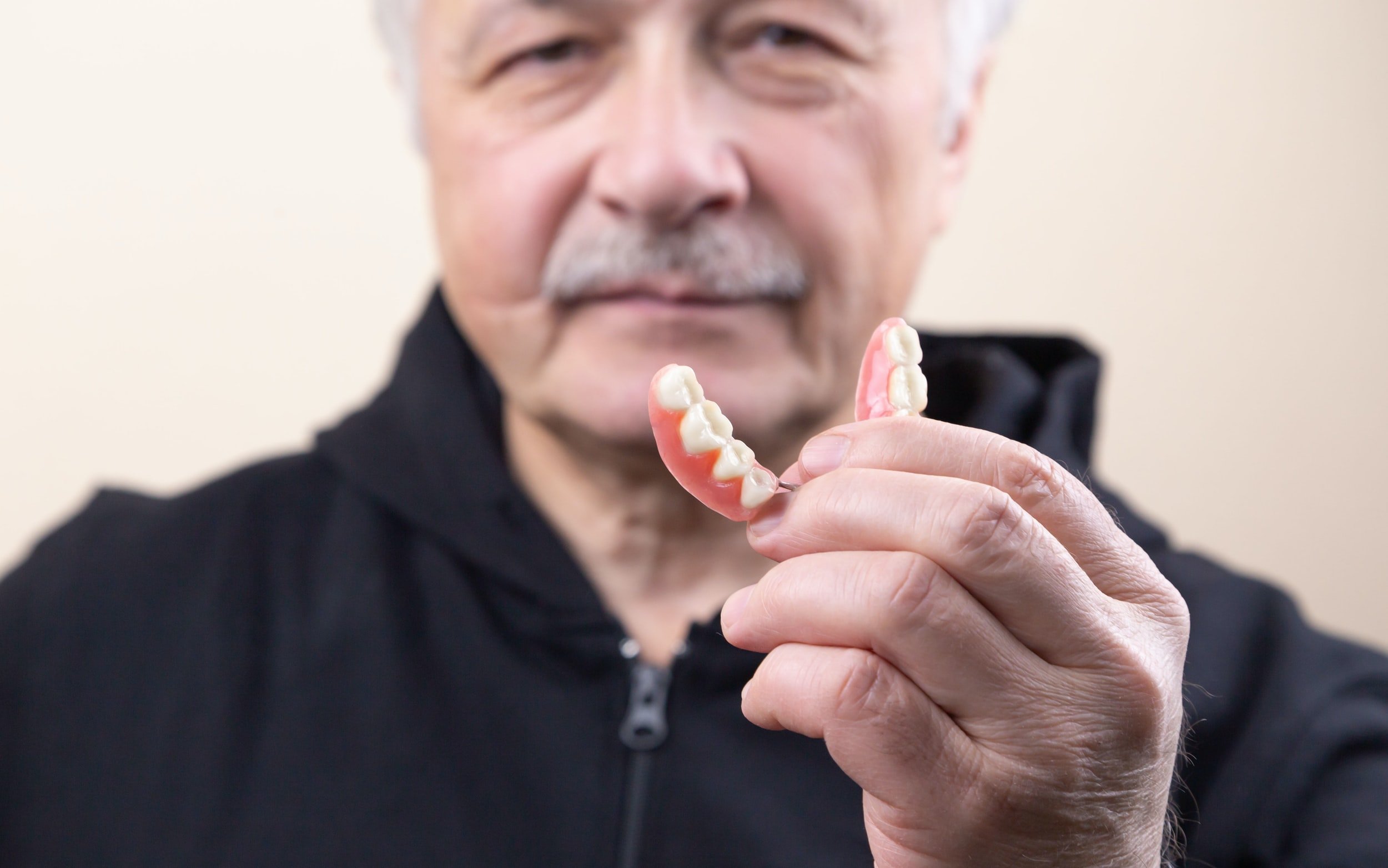 Removable dentures are cheap, which is why many patients tend to consider them as option number one. They are used to fit the entire upper or lower jaw. When placed immediately after extraction, there will be swelling. Once it has disappeared, the dentures need relining (or even remaking) as they will no longer fit well. Should you choose this option, you should get practical advice on maintenance and denture repair.
Removable dentures are cheap, which is why many patients tend to consider them as option number one. They are used to fit the entire upper or lower jaw. When placed immediately after extraction, there will be swelling. Once it has disappeared, the dentures need relining (or even remaking) as they will no longer fit well. Should you choose this option, you should get practical advice on maintenance and denture repair.
Advantages:
- A cheaper solution to replace an entire jaw
- Longevity 5-10 years
- Choice of shape and colour
Disadvantages:
- Adhesives – need to be glued and can fall at any time
- Long-term discomfort – they become less comfortable as the mouth naturally changes shape
- The feeling of a foreign object in the mouth, which may lead to a gag reflex
- Potential loss of taste as they cover the upper palate
- Inability to enjoy your favorite food as you may break or dislocate the dentures
Partial denture
This temporary device resembles a retainer and replaces one or multiple teeth. The perk is that it can be easily removed and cleaned whilst still looking natural. It is considered an affordable solution for people who have lost one or more teeth because of an accident, injury or severe decay. Given they are among the cheapest alternatives to dental bridges or fixed teeth, their durability is suboptimal.
Still, you can get it through your local dentist. Firstly, they need to get an impression of the jaw with a soft material or an intraoral scanner. Then it is sent to a laboratory where it is used to create the prosthetic teeth.
Partial dentures can be made of plastic and/ or metal and can be used when several teeth are missing, but the adjacent teeth are still present. As seen in the picture above, the plastic part is usually fixed to healthy teeth nearby. Partial dentures can be taken off at any time.
Advantages:
- Cheap solution
- Natural-looking – they match the colour of the gums and natural teeth
- Suitable in cases when a few teeth next to each other need replacement
Disadvantages:
- Uncomfortable
- May cause gag reflex
- Short-term solution – since it’s fixed to natural teeth, they would wear out in time
Dentures on the NHS
Bridges and dentures are far inferior as opposed to dental implants in terms of both aesthetics and durability. They have a significantly shorter lifespan (bridges/ removable dentures 5-10 years; implants 20+ years).
Complete dentures would typically cost £200-400. However, the look and feel that they offer is far less natural. Dentures fall under the band 3 types of treatments that can be done with the NHS.
What are Dental Implants?
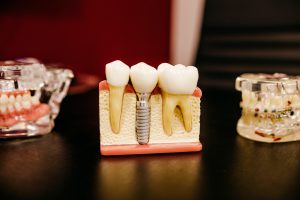 Dental implants are a long-term alternative to removable dentures, designed to fill the void left behind by missing teeth. They also serve to prevent further bone loss. Despite the complex nature of the procedure, getting fixed teeth holds more benefits than dentures.
Dental implants are a long-term alternative to removable dentures, designed to fill the void left behind by missing teeth. They also serve to prevent further bone loss. Despite the complex nature of the procedure, getting fixed teeth holds more benefits than dentures.
Dental implants are a non-removable, extremely durable and natural-looking alternative to all types of dentures and dental bridges. They are the most appropriate long-term solution for toothless or nearly toothless patients. Dental implantation involves screwing implants into the jawbone, followed by placing fixed teeth on top.
The approach, process and duration are strictly individual. They depend on the type and number of implants and the strength of the jawbone. Among the top benefits of implants is that in conjunction with the fixed teeth over them, they offer the looks and functionality of natural teeth.
The teeth-in-a-day (also known as All-on-6/ All-on-4) procedure at Dentaprime F3T is the perfect solution for people who have lost all of their teeth. It involves placing a set of 6 implants in the upper and 4 implants in the lower jaw with fixed teeth over them. Usually, the procedure is done within 24 hrs which is where the name derives from.
The dental implantation process is dependent on your current oral condition and bone quality. For example – bone grafting/ sinus lift is only needed when the jaw bone strength is insufficient. This would be assessed during your onsite examination which can be scheduled either online or over the phone.
Maintenance of dentures vs. dental implants
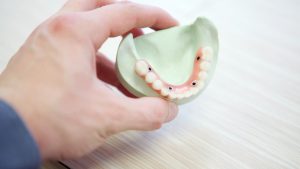 Maintenance of fixed dentures over implants is easy and just the same as cleaning natural teeth. It involves brushing twice a day with a soft-bristle brush, as well as using a waterpik to take care of any food that may have been trapped under the fixed teeth. And most importantly – attending your regular checkups religiously.
Maintenance of fixed dentures over implants is easy and just the same as cleaning natural teeth. It involves brushing twice a day with a soft-bristle brush, as well as using a waterpik to take care of any food that may have been trapped under the fixed teeth. And most importantly – attending your regular checkups religiously.
Removable dentures, on the other hand, need some extra work and care if you want to make sure you would have them in the optimal state. Firstly, they need to be cleaned a few times per day – remove after every meal and brush just like natural teeth. It is quite common that adhesive particles may still linger in your gums, so you need to brush those away as well. It’s important to note that you need to take them off overnight and have them soaked in an appropriate cleaning solution.
Disclaimer: Remaining toothless inevitably alters your bite – be it bone loss or simply shifting the muscles used for mastication. As a result, dentures need occasional refitting. On the contrary, since dental implants are firmly embedded in the jaw and they do not shift or slip, no changes will be made to your overall appearance if you go for fixed teeth. Moreover, since dental implants serve as a prevention of bone loss, you will look even younger.
Snap-in dentures
 This type of restoration is a hybrid of dentures and fixed teeth over implants. They can be either fixed or removable. The fixed one is typically offered in cases of severe bone resorption (if a patient has been wearing a removable denture for 20 years, for example) to provide better stability in the maxilla. They don’t rely on adhesives to remain in place since they are implant-supported.
This type of restoration is a hybrid of dentures and fixed teeth over implants. They can be either fixed or removable. The fixed one is typically offered in cases of severe bone resorption (if a patient has been wearing a removable denture for 20 years, for example) to provide better stability in the maxilla. They don’t rely on adhesives to remain in place since they are implant-supported.
Another type of restoration appropriate for toothless patients is the bar overdenture. It is, however, suitable for patients who can be diligent with cleaning. It requires serious attention, especially in the small gaps where food tends to get stuck.
A bar can make the denture stable. Still, there needs to be enough restorative space. It also protects the implants by distributing the load above them smoothly.
Bars are not a one-size-fits-all solution, though. They lead to a more complex restorative process and occupy too much space. A removable snap-on denture is trouble-free for maintenance and tackling potential complications.
Dental bridges
Another alternative option to dental implants and partial dentures are dental bridges. A bridge consists of an artificial tooth (pontic) which is supported by natural teeth on each side of the gap left by the missing tooth. Pontics can be made of different materials. It depends on the patient’s preference – even gold. The most common ones are ceramic for better aesthetics. Firstly, the adjacent teeth are prepared (finely filed) as they will bear the bridge. Then, impressions are taken and sent to the laboratory. Following the production process, the bridge is firmly fixed onto the pillars.
Depending on the type of supporting pillars, there can be implant-supported bridges as well. The procedure involves screwing an implant in the position of a missing tooth and having a bridge pontic to join two implants with crowns on each side.
Dental bridges have a lifespan of 5-15 years and need replacement, depending on how well they are cared for. Implants, on the other hand, are considered to be a permanent, often a lifetime solution. In both cases, oral hygiene is crucial and determines the longevity of the dental work done.
Bringing it all together
Absent teeth can affect your appearance, ability to eat your favourite foods, and take a toll on your overall quality of life. Luckily, you no longer have to stay toothless as modern dentistry offers different solutions according to your needs and budget. Dental prostheses are among the most common alternatives to tooth loss. They can restore your bite force and bring back your smile. All dental prostheses have both risks and benefits with implant-supported dentures being the best solution overall. Before committing, discuss all available options with your dentist.
If you are still wondering how to choose the right one, it all boils down to your individual needs. Among key decision-making factors, we recommend investigating the following:
- Price
- Comfort
- Durability
- Oral hygiene
- Aesthetics
Make sure you rely not only on internet research but also talk to a registered dental professional so that you can get appropriate advice with the concern of your individual needs. Book your free dental consultation with Dentaprime F3T and get a non-binding quote. Don’t settle for less than perfect for your oral health – invest in the best and improve your health and quality of life today.


